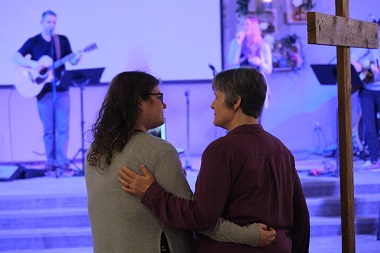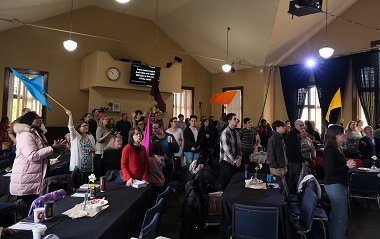
Cam Roxburgh argues that if we want to be on mission, “we may need to rethink how we are gathering for worship.” Image from The Neighbourhood Church
Creating Conversation is a weekly editorial, curated by the Centre for Missional Leadership (CML), which gives opportunity for people to speak about issues they believe are vital for the church in Vancouver.
One of the goals of this weekly article is to spark dialogue – and action. We invite you to join the dialogue here on the Church for Vancouver website.
We also invite you to use the article as a discussion starter with your small group, church staff, friends and your neighbours. Thanks for participating in the conversation!
When people tell me they are missional, I listen for how they are using the word. I often hear an emphasis on ‘outreach’ and so little on worship as mission. Being missional means that we bear witness to the God of mission – in all we do.
Worship is a key part of what it means for God’s people to join Him on mission. We may need to rethink how we are gathering for worship and what we are saying about the God we love.
In Leviticus 1, the Israelites found themselves in the wilderness, with the promised land in sight. Was this the spiritual equivalent of going to Disneyland for winning the Superbowl? Not so much. A correct understanding of Genesis 12 reveals that this was God’s plan to draw all people to Himself through being blessed through the Jews.
One problem. God knew that when His people entered the promised land they would be seduced into worshipping the other God’s of the land. He instructed them as to how worship Him, so that they would bear witness to Him.
Enter the peculiar prescription for worship in Leviticus 1. We read it and are puzzled, but a Jew reads it and knows that you cannot worship the one and only true God without worshipping Him with everything you have. How you worship declares what you believe about the one whom you are worshipping.
We initially may come away with little in the way of instruction for our corporate worship of God, but a deeper dive reveals many practices that will bring our worship to life. We no longer make sacrifices – that was done once and for all through Christ. But there are practices for churches claiming to be missional that must be engaged in.
What we bring

The Neighbourhood Church
First, worship is not primarily about what we get, but about what we bring. The purpose and posture of worship consists in what gifts we bring to our king. The Jews understood this in the instructions they were given. We seem to have this reversed and are more focused on what we get from the ‘worship service.’
We may have created a consumer culture through our ‘worship experiences.’ We become good at creating ‘worship services’ so that we achieve the desired emotions and actions, instead of being faithful to bring to God our offerings out of gratitude for what He is doing.
What would our gatherings look like if every disciple brought a gift for the king? What do we bring?
We bring gifts of money, reflecting our gratitude to what He has given us. More churches are bringing stories of where they have experienced the presence and power of the Lord at work in their mission fields. Joy is produced through evidence of God at work rather than just singing our favourite songs. If we are telling stories of God at work, it doesn’t matter much to us whether we like this or that song, or the way this band plays it.
Costly offering
Second, the Jews also knew that one could not bring something to give the most Holy God unless it was one’s best. It was a costly offering, not a cheap one. What they brought to give indicated who they thought He was.
There was no room for bringing leftovers or what they thought they might spare. Instead, they brought their best and their most costly. Often the animal sacrificed for the Jews had been carefully raised (as a part of the family) for profit and sustenance.
In bringing their best, the Jews made a clear statement about who they thought God was and how He sustained them. What does our financial giving indicate about who we think God is? What does our unwillingness to give up some of our rights and comforts indicate about our worship of the one we call Lord?
Whole person
Third, the process of dragging one’s prize bull from behind the hut (think house) down the street to the temple and slitting its throat does not easily compare to the experience we try and create today.
Many corporate gatherings today try and engage only our hearts and minds. Many seek an intellectual experience through preaching and other components. Others seek more of an emotional experience through music, arts and ambiance.
In giving the guidelines for worship that He did, God wanted the whole person to engage in worship – not just a part of them. Worship involves our whole being. It is not just a cerebral or emotional experience on its own, but also the surrender of all of who we are to all of who He is. It is the engagement of our whole being. How might we restructure our gatherings that engaged our whole being?
Full participation
Fourth, full participation is found in the text. Worship is never a spectator event, but rather something in which all participated. Nor was it a private event. It was for the community. One cannot help but see in passages such as Psalm 122, that worship was for the whole of God’s people and involved each person.
We have drifted from this practice also. I have been privileged in the past two decades, to attend many churches from all kinds of traditions. Yet I have witnessed a drift in the way we gather. We have moved towards being ‘specialists’ performing for the audience both in preaching and in singing.
We need a renewed perspective on full participation by all of God’s people in bringing Him our best gifts to adequately reflect who He is.
I was at a church planting meeting a number of years ago. Two contrasting planting groups were having a dialogue about ‘worship.’
One team was excited for their prospects because they had the neatest, greatest, latest band around. They knew they would grow as a result of their ‘tight’ band that had even produced CDs.
The other team was led by a middle age man that had been through the planting wars before. He commented that they had a different philosophy of worship. They encouraged everyone to bring whatever instrument or noisemaker they had to their gatherings each week and to participate, as they were able. They still had leadership, but were not all about only the experts leading from the front.
The younger team was not convinced that would work. In fact they were very convinced that it would not draw a crowd.
A drama
Of course there are many more principles in this text about how we need to worship. But let me finish with a fifth principle that my friend Brian Buhler pointed out to me. True worship is a drama of the story of God. God’s instructions encouraged His people to ‘act out’ the story of the gospel.
In the Old Testament, the sacrifice on the altar looked forward to the gift of the Messiah who would redeem all things. In the New Testament, we no longer sacrifice on the altar, but we must continue to see our gathering for worship as a drama that demonstrates the good news of the kingdom.
Communion is the drama we must act out on a regular basis. How crucial is it for us to be creative with how we come to the Lord’s table and receive His hospitality. We need to make the table the central piece of our gatherings.

Cam Roxburgh has several roles, including Senior Pastor of The Neighbourhood Church.
How different would Sunday mornings be in our city if we invited people to bring their best each week instead of coming to ‘get’ something? What difference would it make if we seriously asked the question of how we were inadvertently producing consumers instead of missionaries through the way that we gather together corporately? How can engage all of the people in more holistic ways so that our worship reflects more of what God intended? How must we worship in order to give the world a better picture of the God we love?
Hard questions that deserve much thought and practice. Worship is one way we participate with the King in His mission, and therefore we must treat it as such.
Cam Roxburgh has been Senior Pastor of The Neighbourhood Church (formerly Southside Community Church) for 30 years. He is the Forge Missional Training Network Executive Director, and the Vice President of Missional Initiatives for the North American Baptists. He is married to Shelley, and together they have four grown kids and one grandchild.
He can be contacted at either 778.863.4471 or cam@theneighbourhoodchurch.net.
